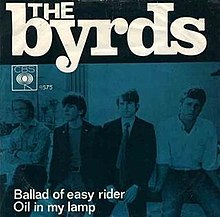
The Byrds were an American rock band formed in Los Angeles, California, in 1964. The band underwent multiple lineup changes throughout its existence, with frontman Roger McGuinn being the sole consistent member. Although their time as one of the most popular groups in the world only lasted for a short period in the mid-1960s, the Byrds are considered by critics to be among the most influential rock acts of their era. Their signature blend of clear harmony singing and McGuinn's jangly 12-string Rickenbacker guitar sound was "absorbed into the vocabulary of rock" and has continued to be influential.
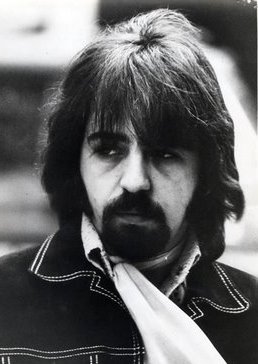
Clarence White was an American bluegrass and country guitarist and singer. He is best known as a member of the bluegrass ensemble the Kentucky Colonels and the rock band the Byrds, as well as for being a pioneer of the musical genre of country rock during the late 1960s. White also worked extensively as a session musician, appearing on recordings by the Everly Brothers, Joe Cocker, Ricky Nelson, Pat Boone, the Monkees, Randy Newman, Gene Clark, Linda Ronstadt, Arlo Guthrie, and Jackson Browne among others.

Ballad of Easy Rider is the eighth album by the American rock band the Byrds and was released in November 1969 on Columbia Records. The album was named after the song "Ballad of Easy Rider", which had been written by the Byrds' guitarist and singer, Roger McGuinn, as the theme song for the 1969 film, Easy Rider. The title was also chosen in an attempt to capitalize on the commercial success of the film, although the majority of the music on the album had no connection with it. Nonetheless, the association with Easy Rider heightened the Byrds' public profile and resulted in Ballad of Easy Rider becoming the band's highest charting album for two years in the U.S.
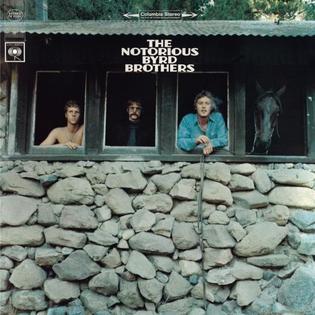
The Notorious Byrd Brothers is the fifth studio album by the American rock band the Byrds, released on January 15, 1968, by Columbia Records. The album represents the pinnacle of the Byrds' late-'60s musical experimentation, with the band blending together elements of psychedelia, folk rock, country, electronic music, baroque pop, and jazz. With producer Gary Usher, they made extensive use of a number of studio effects and production techniques, including phasing, flanging, and spatial panning. The Byrds also introduced the sound of the pedal steel guitar and the Moog modular synthesizer into their music, making it one of the first LP releases on which the Moog appears.
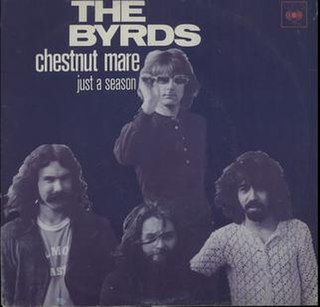
"Chestnut Mare" is a song by the American rock band the Byrds, written by Roger McGuinn and Jacques Levy during 1969 for a planned country rock musical named Gene Tryp. The musical was never staged and the song was instead released in September 1970 as part of the Byrds' (Untitled) album. It was later issued as a single, peaking at number 121 on the Billboard singles chart and number 19 on the UK Singles Chart.

Turn! Turn! Turn! is the second studio album by the American rock band the Byrds, released on December 6, 1965, by Columbia Records. Like its predecessor, Mr. Tambourine Man, the album epitomized the folk rock genre and continued the band's successful mix of vocal harmony and jangly twelve-string Rickenbacker guitar. The album's lead single and title track, "Turn! Turn! Turn!", which was adapted by Pete Seeger from text in the Book of Ecclesiastes, had previously been arranged in a chamber-folk style by the Byrd's lead guitarist Jim McGuinn for folk singer Judy Collins' third album, but the arrangement he used for the Byrds' recording of the song utilizes the same folk-rock style as the band's previous hit singles.

The Byrds' Greatest Hits is the first greatest hits album by the American rock band the Byrds and was released in August 1967 on Columbia Records. It is the top-selling album in the Byrds' catalogue and reached number 6 on the Billboard Top LPs chart, but failed to chart in the UK.

Dr. Byrds & Mr. Hyde is the seventh studio album by the American rock band the Byrds and was released in March 1969 on Columbia Records. The album was produced by Bob Johnston and saw the band juxtaposing country rock material with psychedelic rock, giving the album a stylistic split-personality that was alluded to in its title. It was the first album to feature the new band line-up of Clarence White (guitar), Gene Parsons (drums), John York (bass), and founding member Roger McGuinn (guitar). Dr. Byrds & Mr. Hyde is unique within the band's discography for being the only album on which McGuinn sings the lead vocal on every track.
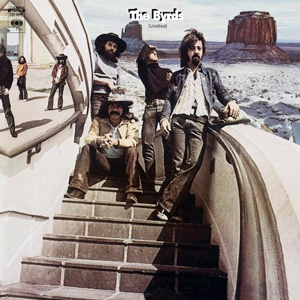
(Untitled) is the ninth album by the American rock band the Byrds and was released in September 1970 on Columbia Records. It is a double album, with the first LP featuring live concert recordings from early 1970, and a second disc consisting of new studio recordings. The album represented the first official release of any live recordings by the band, as well as the first appearance on a Byrds' record of new recruit Skip Battin, who had replaced the band's previous bass player, John York, in late 1969.
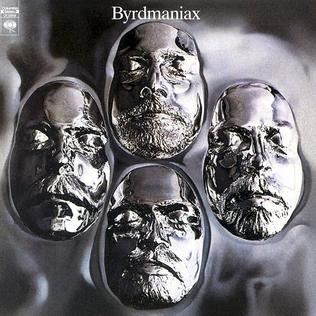
Byrdmaniax is the tenth album by the American rock band the Byrds. It was released in June 1971 on Columbia Records at a time of renewed commercial and critical success for the band, due to the positive reception that their two previous albums, Ballad of Easy Rider and (Untitled), had received. The album was the second by the Byrds to feature the Roger McGuinn, Clarence White, Gene Parsons, and Skip Battin line-up of the band and was mostly recorded in early 1971, while the band were in the midst of an exhausting tour schedule. As a result, the band had little time to hone their new songs before recording commenced and thus, much of the material on the album is underdeveloped. Byrdmaniax was poorly received upon release, particularly in the United States, and did much to undermine the Byrds' new-found popularity.

Farther Along is the eleventh album by the American rock band the Byrds and was released in November 1971 on Columbia Records. For the most part, the album was recorded and produced by the Byrds themselves in London, England, over the course of five work-intensive days in July 1971. It was quickly released as a reaction to the commercial failure of the Byrds' previous album, Byrdmaniax, and as an attempt to stem the criticism that album was receiving in the music press.

The Best of The Byrds: Greatest Hits, Volume II is the third greatest hits album by the American rock band the Byrds, but only the second to be released in the United States, since the earlier The Byrds' Greatest Hits Volume II had only been issued in the UK. The album was released in the U.S. by Columbia Records on November 10, 1972 in lieu of any new Byrds' product during that year. It spent a total of thirteen weeks on the Billboard Top LPs & Tapes chart and peaked at number 114.

Byrds is the twelfth and final studio album by the American rock band the Byrds and was released in March 1973 on Asylum Records. It was recorded as the centerpiece of a reunion among the five original band members: Roger McGuinn, Gene Clark, David Crosby, Chris Hillman, and Michael Clarke. The last time that all five members had worked together as the Byrds was in 1966, prior to Clark's departure from the band. During the reunion, the current, latter-day lineup of the band continued to make live appearances until February 1973, with McGuinn being the only member common to both versions of the group.

The Byrds is a four-CD box set by the American rock band the Byrds. It features music that had previously been released between the mid-1960s and early 1970s, along with a number of previously unreleased tracks and some new recordings from 1990. The box set was issued on October 19, 1990, by Columbia/Legacy and reached number 151 on the Billboard albums chart.

"5D (Fifth Dimension)" is a song by the American rock band the Byrds, written by band member Jim McGuinn. It was released as a single in June 1966, and also included as the title track on the Byrds' third album, Fifth Dimension.
"Triad" is a song written by American singer-songwriter David Crosby in 1967 about a ménage à trois. It was recorded by the Byrds that year, while Crosby was a member of the band, but their version went unreleased at the time and was not issued until twenty years later. Jefferson Airplane released a version of the song in 1968 on their Crown of Creation album and a live version performed by Crosby was included on Crosby, Stills, Nash & Young's 4 Way Street in 1971.

Preflyte is a compilation album by the American folk rock band the Byrds and was released in July 1969 on Together Records. The album is a collection of demos recorded by the Byrds at World Pacific Studios in Los Angeles during late 1964, before the band had signed to Columbia Records and become famous. It includes early demo versions of the songs "Here Without You", "You Won't Have to Cry", "I Knew I'd Want You", and "Mr. Tambourine Man", all of which appeared in re-recorded form on the band's 1965 debut album.

The Byrds' Greatest Hits Volume II is the second greatest hits album by the American rock band the Byrds. It was released in the United Kingdom and Europe on October 29, 1971, by CBS Records as a follow-up to the band's first compilation album, The Byrds' Greatest Hits. The album appeared following the band's successful appearance at the Lincoln Folk Festival in England on July 24, 1971, and according to band biographer Johnny Rogan may have been issued by CBS as a reaction to the band's previous studio album, Byrdmaniax, having failed to chart in the UK.
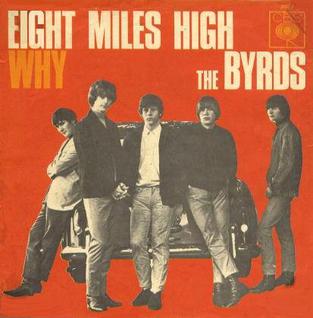
"Why" is a song by the American rock band the Byrds, written by David Crosby and Jim McGuinn and first released as the B-side of the band's "Eight Miles High" single in March 1966. The song was re-recorded in December 1966 and released for a second time as part of the band's Younger Than Yesterday album.

History of The Byrds is a double album compilation by the American rock band the Byrds and was released on May 18, 1973 by CBS Records. The compilation was released exclusively in Europe and the UK, peaking at number 47 on the UK Albums Chart, but it was also available in the United States as an import.
